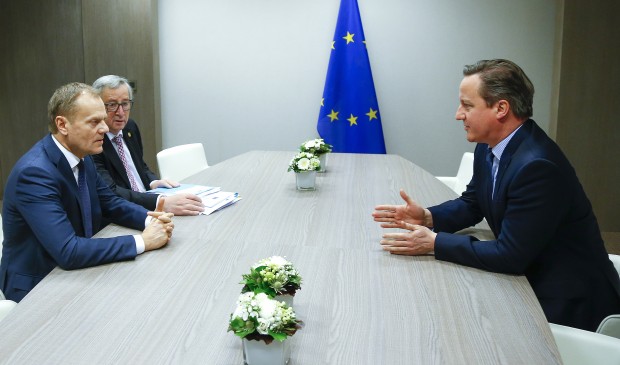Cameron, EU leaders still have ‘lot to do’ to reach deal

European Council president Donald Tusk (left) and European Commission president Jean-Claude Juncker (second left) participate in a meeting with British Prime Minister David Cameron during an EU summit in Brussels on Feb. 19. European Union leaders are holding a summit in Brussels on Thursday and Friday to hammer out a deal designed to keep Britain in the 28-nation bloc. AP
BRUSSELS—British Prime Minister David Cameron faces tough new talks with European partners Friday after through-the-night meetings failed to make much progress on his demands for a less intrusive European Union.
Britain’s future in the union—along with heightened tensions around Europe’s migrant crisis—are dominating an EU summit in Brussels scheduled to finish Friday with what Cameron hopes is a breakthrough deal for EU reform.
Cameron wrapped up talks in Brussels with EU President Donald Tusk and others around 5:30 a.m. (0430GMT), and is expected to resume bilateral meetings late morning. An EU-wide breakfast meeting set to address Cameron’s concerns was delayed until lunch. A British official speaking on customary condition of anonymity said Friday morning there are “some signs of progress but nothing yet agreed and still a lot to do.”
It’s potentially a pivotal moment for the EU and decades of integration among once-enemy nations. Britain is questioning whether belonging to the bloc is still worth it, so Cameron is pushing for an EU reform deal that will let him urge Britons to approve continued membership in a referendum that could come as soon as June.
Cameron said he was “battling for Britain” and told his fellow leaders that he needed a substantial deal that would be “credible for the British people.” The British referendum is likely to be close and hard-fought.
He’s run into tougher-than-expected resistance for the changes he’s seeking, notably from France. French President Francois Hollande warned Thursday that no individual leader should be allowed to stop closer European cooperation, and that ceding too much to Britain—especially on lightening financial regulation—could prompt other countries to demand special rules, too, undermining the whole idea of unity.
The draft deal offers guarantees to countries, including Britain, that do not use the shared euro currency, and makes tweaks aimed at boosting competitiveness and giving national parliaments more power.
A key sticking point is Britain’s push to limit benefit payments to workers from other EU countries.
Immigration is an especially sensitive point for British voters, because Britain has attracted hundreds of thousands of workers from eastern European nations in the past decade, drawn by the prospect of higher-paying jobs. The EU immigrants can also claim tax credits and other benefits in Britain, which Cameron’s government says is straining the budget.
Cameron has proposed limiting one payment—child benefit, given to all families with children—to migrants from other EU nations for at least 10 years, while eastern countries argued for three or four years, according to one European official involved in the talks.
Elmar Brok, a European Parliament legislator from Germany who is working as a negotiator at the talks, said Friday he believed the “major problems are solved.” But he told the BBC that the welfare brake remained contentious, with some countries finding Britain’s aim of a curb on benefits lasting a decade or more “very difficult to accept.”
Dutch Prime Minister Mark Rutte argued Friday for the importance of keeping Britain’s free-market voice in the EU. A British exit, he said, “would be bad news for the EU—but also for the U.K. It would end up as a mid-sized economy somewhere in the middle of the Atlantic Ocean.”
Britain has stayed out of both the euro currency and the passport-free Schengen travel zone, and many Britons resent what they see as Brussels increasingly meddling in sovereign issues.
Cameron said he would not stop other EU members striving for more unity, but insisted Britain should have ironclad guarantees that it could stay on the sidelines.